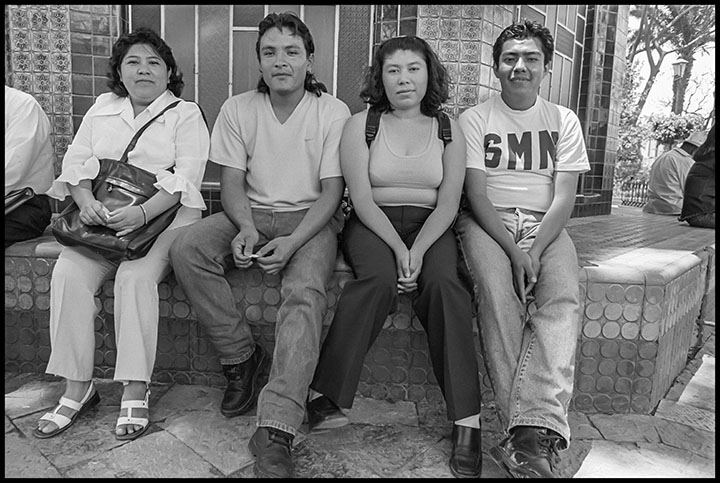 Members of the original independent union committee at the Mex Mode maquiladora. Interviews with organizers Julia Quiñones and Julieta Morales offer their vision for a new era of labor solidarity. These interviews forms part of a series of interviews with prominent Mexican labor leaders conducted by photojournalist, author, political activist and union organizer David Bacon. These interviews are a collaboration between IRLE, the Labor Center and the Center for Mexican Studies at UCLA. Organizing among maquiladora workers, especially in the factories on the border, has gone in waves over the past four decades. In many cases, those efforts have led to the creation of cross-border relationships between unions and activists on both sides of the Mexico/U.S. border, and even to organizational structures that produced programs and actions beyond supporting individual campaigns. Because of the demographics of the maquiladora workforce, some of the most important organizers have been women. Today another wave of organizing activity is growing, and with it debates about how new independent unions should be organized, and the relationship they should have to established unions in both countries. Julia Quiñones and Julieta Morales are veterans of these efforts, and in these interviews offer their visions for a new era of labor activity and solidarity. Julia Quiñones is the director of the Comite Fronteriza de Obreras (the Border Committee of Workers), one of the most important organizations in the long history of the efforts to organize workers in the maquiladoras on the Mexico/U.S. border. CFO began officially in '98, but Quiñones was doing basic work long before. She offers the perspective of a veteran of the border labor wars. When I interviewed her at a conference organized by the Solidarity Center and the UCLA Labor Center, she began by saying that this cross-border effort was happening "in a new era." 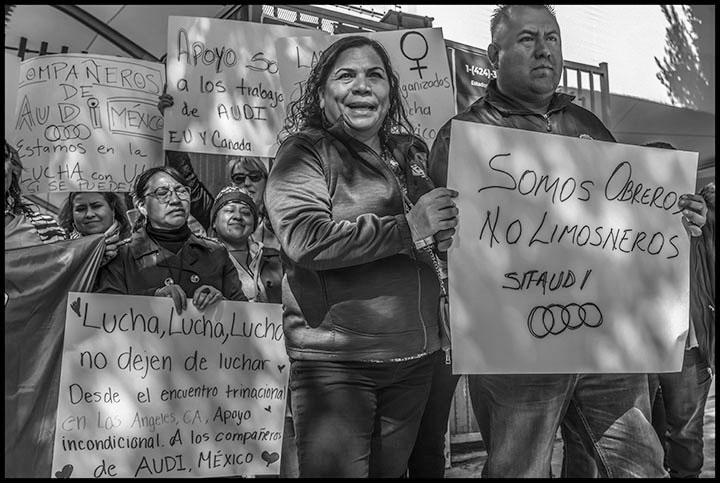 Julia Quiñones with a strike leader from the Audi assembly plant. JULIA QUINONES We need more than yesterday's ideas. A lot of things have changed in Mexico. There is a lot of movement now at the national level and changes are taking place. In Mexico we had the 2019 labor reform, and in the United States recently there was the big autoworkers strike. We've learned a great deal from both. Now many unions and organizations in Mexico are looking for ways we can influence this movement more effectively. This is also a cultural moment, where workers have to learn to work together because they work for the same companies. In the past the possibility of having independent unions on the border, in the maquilas, practically didn't exist. That was the situation for decades. Now I think that we are seeing the possibility of seeing real unions, if the charros don't take it away from us. I would like to be optimistic and say we still have the initiative, because the conditions are still there. But we have to deal with the history of so many years of oppression by corporate unions. The change is not going to be easy, and the charros are defending themselves. On the other hand, we have the initiatives of many independent workers who are seeking to build new organizations, but they often lack a lot of confidence. Until recently there was a lot of apathy, and workers would say, no se puede, that things could not be changed. We have to develop new strategies and I believe that it can be done. This is what we have been working on for 4 years. In 2019 CFO began a project to make workers aware of the labor reform. This is something that the Ministry of Labor was also doing, but at the CFO we believe that it is important to bring this information from person to person, through small group meetings, so that workers truly understand the opportunities they have now. The more they know, the more they spread the information through their social connections with co-workers. In the last three years we have supported four organizing campaigns. In one they were able to create an independent union, and in another it barely exists yet. Workers were able to create an independent union (using the sponsorship of the Liga Sindical Obrera Mexicana) in a company called Delta Staff. This is a garment company that produces for brands like The Gap and Levi's. They make pants, belts and uniforms. Eighty-seven percent of the workers voted for an independent union against the CTM. Things happen by systematically accompanying the workers, by training leaders, and by promoting gender empowerment. But nothing is going to happen just because the opportunity exists. You have to do a lot of organizational work. There has been a lot of talk about the TMEC and the labor reform, but they only create opportunity. You need to organize people. But the workers have to make the decisions, even if there is a lot of money and many organizers. We need to help workers make a comprehensive plan, that is, by giving them training in creating a strategy, and by looking for leaders. These are steps that have to be followed before we can make changes. Union support for campaigns is also important, especially by unions on the other side of the border, like the UAW. In the past it was much easier to organize if we could use an existing registry of another union. CFO had a relationship with the miners and they had a relationship with the United Steel Workers (USW). In the Delta Staff campaign, CFO had the support of Workers United, which represents Levi's workers in the U.S. 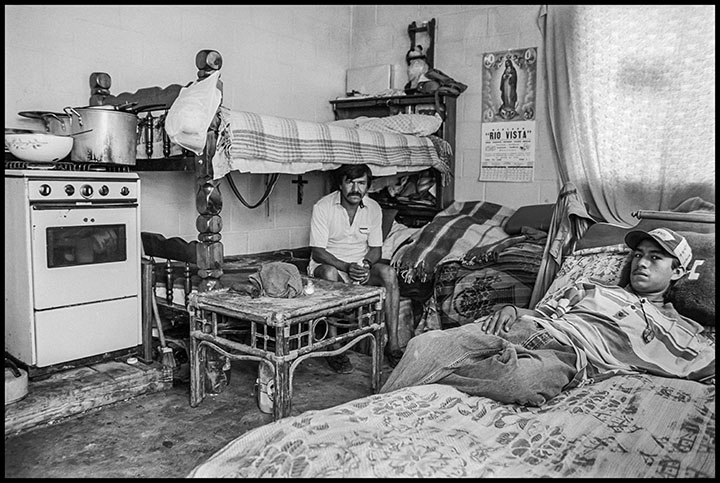 Francisco Ortiz worked at Ken-Mex, a medical products plant built in Tijuana in the 1980s by Kendall International. He shared a small house, in a neighborhood below Otay Mesa, with three sons, who lived with him in the front room, with his uncle, his wife and children, and with his mother and grandmother. Today workers have more options. Now there are ways workers can create their own independent union. This is something that will have to be explored. Solidarity and the work of exchanges within the independent labor movement are very important. It is very important that workers do not feel isolated, that those who want to organize have a network, a support system. That is also why international union solidarity is very important. Companies that are in Mexico have headquarters in the United States or in other countries, so we need to make connections there with unions, with shareholders, with brands. That helps to neutralize the company when they try to intervene to stop workers from organizing. Organizations on the border have always lacked resources. Today we really want to have an impact. In the past our organization has been very small, just 8 or 10 people. Now we have to grow. We have 30 people today, but of course having them creates new challenges. How do we guarantee the work of these teams will continue? No fight is automatic, that is, it takes 2 or 3 years to have an impact. We have to create a stable basis for this work, because things may change in the future. Ten years down the line, who knows what the situation will be? That is why it is very important to create self-sufficient, self-managing organizations, and not depend always on international solidarity to develop organizing campaigns. If there is more self-sustainability, then organizational projects can continue. Labor reform will have an impact on the labor movement in Mexico in general, not only in the export factories. The impact is going to be general. It is going to take longer than we had expected and we truly hope that with the coming change in government this reform will be sustained and not thrown out. If the same policy continues, at least of the current President, we hope there will be no setback in what's already been achieved. Now there is a new attitude on the part of the automobile union in the United States. We have already had several meetings with UAW unions, and they really have a vision now. There's more openness and more collaboration with our movement. At this particular meeting it is important to have a plan at least to keep in touch. We need better communication so we can share struggles. This meeting is a bit strange, because it's a mix of people from big factories and Uber drivers and domestic workers. We need to close the gaps between us. Both domestic workers and workers in the informal sector seek strategies to guarantee their rights. We can learn a lot from them, and also from the large already established unions, such as the automobile unions or the electrical workers or others. There is a new role for working women here at this meeting. It's very, very interesting. When we divided ourselves into sectors, the groups were dominated by men in the automotive sector, while in the others there were many more women. In the group of domestic workers there was only one man and a male baby. This does not reflect the gender composition that predominates in the industry. It's something we have to work on. In fact, reforms in Mexico now require companies to have gender protocols. But is gender equality required in the union leadership under the labor reform? We have to look at that, and at other areas too. 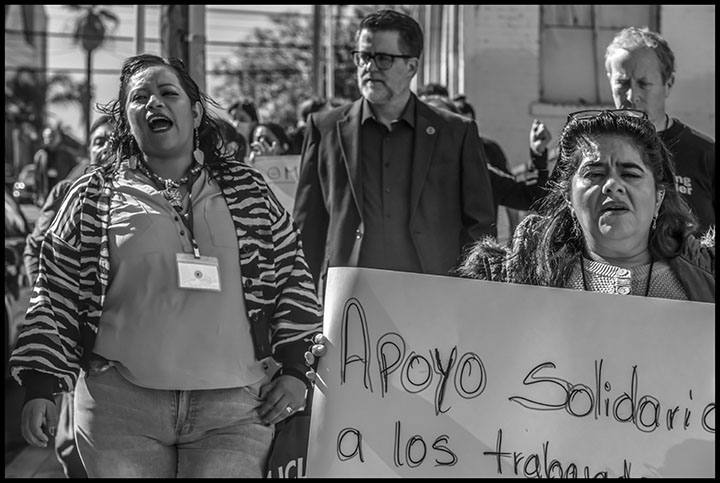 Julieta Morales marches to the Mexican consulate in Los Angeles in support of the Audi strikers. Julieta Morales today is the General Secretary of the Union League of Mexican Workers (Liga Sindical Obrera Mexicana), and worked at a garment factory, Mex Mode, that was the scene of one of the first successful battles to form an independent union in the maquiladoras. The League was formed in Atlixco, Puebla, after workers organized the union at Mex Mode, and today has gone on to help workers organize independent unions in a number of other factories. JULIETA MORALES I worked in that maquiladora (Mex Mode), and it took courage to stand up against all the violations of our rights in the plant. There was a lot of discrimination, workplace harassment and our wages at that time were 70 pesos. That was what started our organizing. At that time, an external organization helped us understand that we had the right to organize, and what unions were. The Solidarity Center supported the Mexican NGO, Centro de Apoyo al Trabajador (Center for Support for Workers - CAT) composed of five local organizers. We won an independent union, but we had many problems after we organized this union. A real workers' union will always be in trouble with the company. During the initial campaign in Mex Mode, workers were beaten at the gate when we were trying to organize. Then we asked for support from students in the United States and on various campuses they told the university they did not want the student stores to sell shoes and other Nike clothing. With this pressure, Nike was forced to put pressure on Mex Mode to remove the charro union and recognize the workers' independent union and negotiate a contract. We are seeing the same possibility or possibilities like this, to help workers in other factories. With the decision made by the people in the factory, the possibility exists of using the same pressure of international solidarity. The brands we are working on right now include Carhartt, North Face, Fanatics, the Kiss, Vans, and Timberland. They are brands exported from Mexico to the United States. Therefore we believe that a good alliance can be built between workers in Mexico and the United States. The raw materials and orders are from the United States, and without them we have no more work. We want the companies to continue to exist here, and we want the brands themselves to understand that our workforce is very strong in Mexico. Let the brands give us more work. We want to prevent our own families from emigrating to the United States because when people leave it becomes complicated for many mothers who are left with the responsibility of their children. But we want to have better conditions. We want brands to establish codes of conduct that are truly respected. Since we work with brands that are expensive, from clothes to cars, we deserve to have better salaries, we deserve to be respected within the plant. We don't want the brands to withdraw because we depend on them. That is our source of work. It's not just the 500 workers, since behind those 500 workers are their families. The charro union threatens people by telling them that the League has alliances with the United States. We're bad because the United States loves us, and wants to take their jobs away. But we know that we only ask that the worker be treated as a human being, as a person. And a foreign company should respect this, because they are coming to our house. And if you are welcome to our house, we are going to set the rules for you. Later, after we organized our independent union, there was a conflict, and Antorcha Campesina set up a company union. It keeps its power by making threats against workers. My coworkers there are from rural communities, so they don't know where to get training or where they can learn about their rights. They are still intimidated. Unfortunately Nike withdrew from Mex Mode, because it said it was not going to give the factory work while there were problems with Antorcha Campesina. So we decided to step aside and fight for a workers' union, where workers are the ones who make the decisions. We set up the Liga in 2021. We have always had the support of the Solidarity Center. It gives us training and helps us plan. It teaches us what our rights are and how far we can go. The League is based on workers, like the first union at Mex Mode in Atlixco. At Mex Mode we began to see that there were more companies that wanted to form their own unions. We started with VU, which became the first section of the League. We had to change our statutes to be able to support other companies when workers formed their own unions. The League grew and now it is national. We have a section in Torreón, Coahuila, our coworkers have organized another at Testar in San Luis Potosí, and another at 3M and at Goodyear. Currently a union in Aguascalientes is being formed by key workers who came from Mex Mode in Atlixco. The factory in Torreón makes jeans. 3M in San Luis Potosí handles all kinds of work, adhesive tape, caps, face masks. Goodyear makes tires. They have the right of representation there now, and at 3M the negotiations are about to start. Even though the League is national, as general secretary I can't go and make decisions in other workers' companies. The workers in each company must have the right to their own voice and the right to make their own demands. They have to prepare, to decide what corresponds to the situation they have in their own plant, and what workers should earn for the benefit of themselves and their families. If a worker has good conditions the whole family benefits, but if a worker is harassed at work, the one who pays the consequences is also the family. We come home angry, stressed, tired and we don't spend quality time with our children. The league is supported by the Solidarity Center, which sends organizers everywhere. At VU people also work with the organizer for CFO, Julia Quiñónez. There the workers themselves asked us if they could join the League. So now there is a strategic relationship between CFO and the League. The League tries to respect the decisions of the workers, not to make decisions for them, not to hinder their work. Because I am General Secretary at the national level, I have the organizers prepare the workers. Then we put more people to work on the plant. But if the workers do not begin to make their own decisions and prepare for their own campaign, we are going to fall back into the charrismo of the other unions. We want to change all that. The workers' committee is the one that must decide what they do within the plant. The worker is the only one who has the right to decide what is good and what is bad for his or her coworkers, for the company, or for their union. In a way, the CFO and the Solidarity Center are allies. Together we learn how to ensure the workers themselves understand they have rights, and that they are the only ones who can unite with other workers to win better working conditions. In the league and the CFO we share values, that the workers are in charge, in terms of the actions they are going to take. The Solidarity Center doesn't pay us. They simply provide us with training. When we go to meetings like this, they help us with the expenses. The League is for workers. It is independent and we do not receive support from any union. We have support alliances. We've supported the strike at Audi, and we have the closest relations with the union at Volkswagen. At this meeting we are looking for international support and alliances. There are other companies where workers are going through the same thing or worse things. So exchanging information makes us stronger, to know that we are not alone, that there are more people who are also fighting, and that united we can win. But often the Mexicans who are our bosses are the ones who trample on and violate our rights. VU was closed and would not accept the independent workers' union. They laid off all the staff, and 70 workers were left without pay. At the VU factory workers are producing for the automotive industry, so it is possible that the UAW union can put pressure through its relationships with large automobile companies. But now the workers who worked at VU, who decided to form their own union, are not being hired in other companies. The doors are being closed to them just for demanding their right to form their own independent union. For other companies to close their doors because workers want to fight for their rights is very unfair, but it is something that will not go away. The companies have a database of these workers. Other companies in Piedras Negras, Coahuila, also have the database of the workers who wanted to belong to the League. If the workers go there to ask for work, their name appears on the list. It's like saying, if you belong to an independent union, you can't work in the plant. That's how it is. That has an impact on the mentality of workers. You will no longer work in any company; you will be left without a job. That is the fear they put in the workers. Their family will pay the price. Now there are many who are working in stores, because you have to look elsewhere. It is also a reason why people are deciding to cross the border. As workers we feel we are being put between a rock and a hard place, as we say in Mexico. Yes I want to demand my rights, yes I want to form an independent union. But if I do it, things could go bad, and I could lose my job. And I'm not going to be able to get more work because no one is going to give me another one. I try to attend meetings to get to know people, what their objectives really are, which ones really are like us, demanding worker rights. When I hear the people in those other jobs, like domestic workers or platform workers, I am impressed by the fact that they are women. I am not saying I am a feminist and resent men, because that is not my role. My role is to say 50/50. Both men and women deserve respect and deserve rights. But these women have the courage to demand their rights. The domestic workers do not work for any company, but are independent in a house, yet they are able to join together and fight for their rights. The platform workers are driving cars, motorcycles, bikes, and skates, which is very dangerous. It does not matter if we work in the fields. We all have rights and together in alliance we will be able to win. WORKING COACHELLA Photographs of the farmworker community of the Coachella Valley by David Bacon - Coachella Library, 1500 Sixth St., Coachella, CA Through August 15, 2024 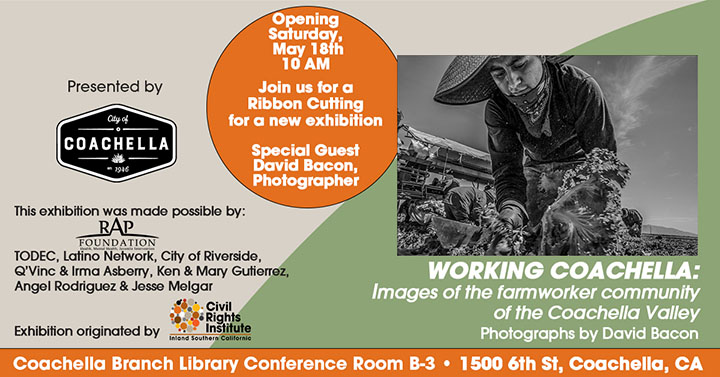 INTERVIEW WITH DAVID BACON AT THE WORKING COACHELLA EXHIBITION IN RIVERSIDE Click here: https://www.instagram.com/p/C2yAtHDPc5Q/ David Bacon's Working Coachella - Labor Heritage Power Hour with Chris Garlock https://www.listennotes.com/podcasts/labor-heritage/david-bacons-working-coachella-FGTeo-nqcuX/ STRAWBERRY WORKERS MAY DAY MARCH Photographs by David Bacon See the full set of photos here Presentation by David Bacon and Ann Lewis about the politics of the "immigration crisis" Http://ouleft.org/wp-content/uploads/4thmonda-immigration-bacon-lewis.mp4 BROOKE ANDERSON PODCAST #8 David came up as a union organizer with the United Farm Workers and United Electrical Workers, then spent decades as a photographer, photojournalist, labor reporter, and radio host covering labor, migration, and global economy. In this week’s episode, we talk David’s journey from organizer to photojournalist, his early influences, the role of movement photographers, the importance of media workers taking collective action to support their labor rights, journalists speaking out to support a ceasefire in Gaza, and advice for new photographers developing their photographic practice. MAS QUE UN MURO Las comunidades fronterizas y sus movimientos de justica social Fotografias de David Bacon Fototeca de Zacatecas Pedro Valtierra Fernando Millapando 406, Centro Historico, Zacatecas Marzo - Mayo, 2024 Cinco Entrivistas sobre esta exposicion, en el Museo Nacional de las Culturas del Mundo, CDMX: Part 1: https://www.youtube.com/watch?v=6eix0HEStpc Part 2: https://www.youtube.com/watch?v=FO4IIBPs06U Part 3: https://www.youtube.com/watch?v=VHtY-fgtsjs Part 4: https://www.youtube.com/watch?v=Xm_MNrEX2Mw Part 5: https://www.youtube.com/watch?v=MpwSuBbgAQs La imagen de una cruz en el cementerio de Holtville, en California, Estados Unidos, con la leyenda “No olvidados”, con la que activistas religiosos reconocen a los migrantes muertos sin identidad, recibe al público de la exposición Más que un muro, de David Bacon. Durante la inauguración, la directora del MNCM, Alejandra Gómez Colorado, manifestó que, desde hace años, este recinto complementa su discurso histórico y etnográfico con reflexiones que vienen desde la fotografía y el arte contemporáneo. Una línea acorde con el trabajo de Bacon, “una expresion dura y cruda de la vida que transcurre de uno y otro lado de la frontera México-Estados Unidos”. Esta obra fotográfica dijo por su parte la jefa de la Unidad de Política Migratoria, Registro e Identidad de Personas, de la Segob, Rocío González Higuera, permiten acercarse a las historias, retos, éxitos y fracasos de cada persona que migra, desde dos puntos: “El primero, la protección de la memoria contra el paso del tiempo, es decir, colocar la lente y los sentimiento sobre objetos y personas que nos permiten evocar que la frontera es un cúmulo de historias en desarrollo; el segundo, es la expresión de posturas frente a los procesos de movilidad, particularmente la migración irregular”. Bacon, fotógrafo, escritor y activista social, comenzó a documentar las vidas y los movimientos sociales de migrantes, trabajadores agrícolas y comunidades afectadas por la globalización, hace casi cuatro décadas. El fotógrafo detalló que su aproximación a estas realidades inició en 1986, siendo trabajador de una fábrica y sindicalista con United Farm Workers. A lo largo de este tiempo, indicó, ha podido registrar cómo la política migratoria implementada por su país devino en una “política de muerte”, al orillar a quienes buscan el sueño americano a transitar por sitios peligrosos como el desierto de Sonora-Arizona. En la línea fronteriza que atraviesa el desierto cual se ubican con exactitud 4,000 etiquetas forenses de restos recuperados de personas identificadas, y casi 2,000 de personas sin identificar. El visitante debe llenar estas fichas, acto que conmemora por unos instantes esas vidas perdidas No obstante, anotó David Bacon, la frontera es también tierra de vivos: “Los otrora pequeños pueblos de Ciudad Juárez y Tijuana son ciudades de millones. La frontera es el escenario de algunas de las luchas sociales más agudas de México. Los trabajadores de las fábricas organizan sindicatos independientes, mientras que los agrícolas se declaran en huelga en los campos de Baja California”. En ese sentido, finalizó, las cerca de 30 fotografías que integran Más que un muro, “nos permiten ver a la gente, sus luchas por los derechos y la igualdad, combatiendo la histeria antiinmigrante y antimexicana”. Pacific Media Workers Guild, CWA Local 39521, adopted a resolution supporting the Labor Call for a Ceasefire in Gaza: https://mediaworkers.org/guild-joins-calls-for-immediate-ceasefire-in-gaza/ WHEN WE SPOKE OUT AGAINST WAR Unearthing the history of protest against the wars in Iraq and Afghanistan Photographs © by David Bacon https://www.flickr.com/photos/56646659@N05/52759801492/in/album-72177720306862427/ BOOKS - LIBROS MORE THAN A WALL / MAS QUE UN MURO 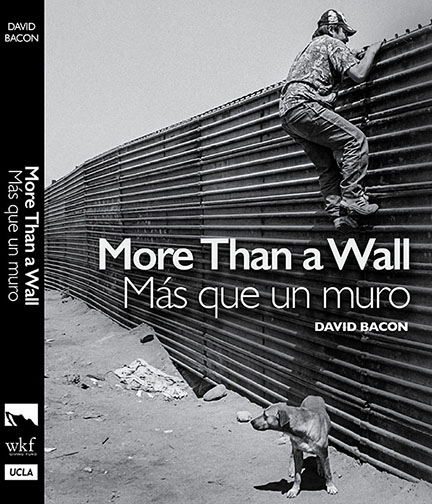 More Than a Wall / Mas que Un Muro explores the many aspects of the border region through photographs taken by David Bacon over a period of 30 years. These photographs trace the changes in the border wall itself, and the social movements in border communities, factories and fields. This bilingual book provides a reality check, to allow us to see the border region as its people, with their own history of movements for rights and equality, and develop an alternative vision in which the border can be a region where people can live and work in solidarity with each other. - Gaspar Rivera-Salgado David Bacon has given us, through his beautiful portraits, the plight of the American migrant worker, and the fierce spirit of those who provide and bring to us comfort and sustenance. -- Lila Downs Published by El Colegio de la Frontera Norte with support from the UCLA Institute for Labor Research and Education and the Center for Mexican Studies, the Werner Kohlstamm Family Fund, and the Green Library at Stanford University Price: $35 plus postage and handling To order, click here: https://david-bacon-photography.square.site/product/more-than-a-wall-mas-que-un-muro/1?cp=true&sa=true&sbp=false&q=false "The "border" is just a line. It's the people who matter." - JoAnn Intili, director, The Werner-Kohnstamm Family Fund IN THE FIELDS OF THE NORTH / EN LOS CAMPOS DEL NORTE 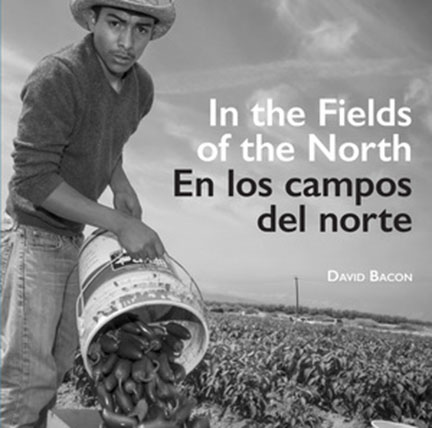 Photographs and text by David Bacon University of California Press / Colegio de la Frontera Norte 302 photographs, 450pp, 9”x9” paperback, $34.95 (in the U.S.) order the book on the UC Press website: ucpress.edu/9780520296077 use source code 16M4197 at checkout, receive a 30% discount En Mexico se puede pedir el libro en el sitio de COLEF: https://www.colef.mx Los Angeles Times reviews In the Fields of the North / En los Campos del Norte - click here 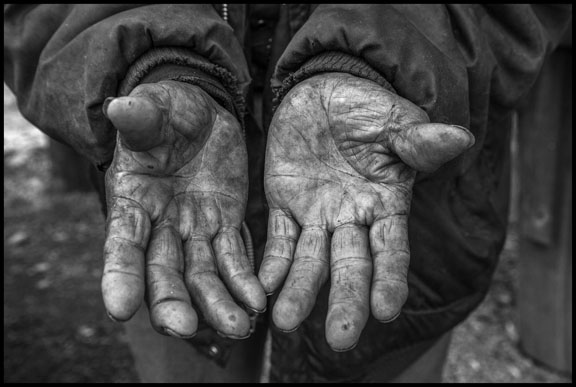 WORK AND SOCIAL JUSTICE: The David Bacon Archive exhibition at Stanford Libraries https://exhibits.stanford.edu/bacon/browse Exhibited throughout the pandemic in the Cecil H. Green Library at Stanford. The online exhibition (https://exhibits.stanford.edu/bacon), which includes additional content not included in the physical show, is accessible to everyone, and is part of an accessible digital spotlight collection that includes significant images from this body of work. For a catalog: (https://web.stanford.edu/dept/spec_coll/NonVendorPubOrderform2017.pdf) Red Lens Episode 6: David Bacon on US-Mexico border photography Brad Segal: On episode 6 of Red Lens, I talk with David Bacon. David Bacon is a California-based writer and documentary photographer. A former union organizer, today he documents labor, the global economy, war and migration, and the struggle for human rights. We talk about David's new book, 'More than a Wall / Mas que un muro' which includes 30 years of his photography and oral histories from communities & struggles in the U.S.-Mexico border region. https://www.youtube.com/watch?v=Nvs6SyXsM-4 Host Mitch Jeserich interviews David Bacon, a photojournalist, author, broadcaster and former labor organizer. He has reported on immigrant and labor issues for decades. His latest book, More Than A Wall, is a collection of his photographs of the border and border communities spanning three decades. Exploitation or Dignity - What Future for Farmworkers UCLA Latin American Institute Based on a new report by the Oakland Institute, journalist and photographer David Bacon documents the systematic abuse of workers in the H-2A program and its impact on the resident farmworker communities, confronted with a race to the bottom in wages and working conditions. https://www.youtube.com/watch?v=UXKa2lHJXMs David Bacon on union solidarity with Iraqi oil worker unions Free City Radio - CKUT 27/10/2021 - https://soundcloud.com/freecityradio/oct-27-2021-ckut-27102021-david-bacon-on-union-solidarity-with-iraqi-oil-worker-unions Organizing during COVID, the intrinsic value of the people who grow our food Sylvia Richardson - Latin Waves Media How community and union organizers came together to get rights for farm workers during COVID, and how surviving COVID has literally been an act of resistance. https://latinwavesmedia.com/wordpress/organizing-during-covid-the-intrinsic-value-of-the-people-who-grow-our-food/ Report Details Slavery-Like Conditions For Immigrant Guest Workers Rising Up With Sonali Kohatkar https://www.oaklandinstitute.org/report-details-slavery-conditions-immigrant-guest-workers The Right to Remain http://www.franknews.us/interviews/415/the-right-to-remain Beware of Pity http://www.franknews.us/interviews/525/beware-of-pity En Español Ruben Luengas - #EnContacto Hablamos con David Bacon de los migrantes y la situación de México frente a los Estados Unidos por ser el principal país de llegada a la frontera de ese país. https://rubenluengas.com/2021/03/video-mexico-estados-unidos-migracion-y-suenos-rotos-encontacto/ Jornaleros agrícolas en EEUU en condiciones más graves por Covid-19: David Bacon SomosMas99 con Agustin Galo Samario https://www.youtube.com/watch?v=YWQSvM9s1lw "Los fotógrafos tomamos partido" Entrevista por Melina Balcázar Moreno - Milenio.com Laberinto http://www.milenio.com/cultura/laberinto/david_baconm-fotografia-melina_balcazar-laberinto-milenio_0_959904035.html David Bacon comparte su mirada del trabajo agrícola de migrantes mexicanos en el Museo Archivo de la Fotografia http://www.cultura.cdmx.gob.mx/comunicacion/nota/0038-18 Online Photography Exhibitions Documentary Matters - View from the US Social Documentary Network Four SDN photographers explore themes of racial justice, migration, and #MeToo https://www.youtube.com/watch?v=fWl-uENA7SQ&t=1641s There's More Work to be Done Housing Assistance Council and National Endowment for the Arts This exhibition documents the work and impact of the struggle for equitable and affordable housing in rural America, inspired by the work of George “Elfie” Ballis. https://www.thereismoreworktobedone.com/david-bacon Dark Eyes A beautiful song by Lila Downs honoring essential workers, accompanied by photographs https://www.youtube.com/watch?v=bdC2gE3SNWw A video about the Social Justice Photography of David Bacon: https://drive.google.com/file/d/14TvAj5nS08ENzWhw3Oxra4LMNKJCLF4z/view In the FIelds of the North Online Exhibit Los Altos History Museum https://www.losaltoshistory.org/exhibits/in-the-fields-of-the-north/ Virtual Tour - In the Fields of the North History Museum of Tijuana Recorrido Virtual de la Exposicion - En los campos del norte Museo de Historia de Tijuana https://www.facebook.com/542258639265202/videos/659536991515786 THE REALITY CHECK - David Bacon blog Other Books by David Bacon - Otros Libros Illegal People -- How Globalization Creates Migration and Criminalizes Immigrants (Beacon Press, 2008) | |
Copyright © 2024 David Bacon Photographs and Stories, All rights reserved. you're on this list because of your interest in david bacon's photographs and stories Our mailing address is: David Bacon Photographs and Stories address on request Oakland, Ca 94601 | |